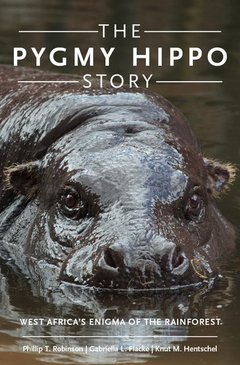Description
The Pygmy Hippo Story
West Africa's Enigma of the Rainforest
Authors: Robinson Phillip T., Hentschel Knut M., Flacke Gabriella L.
Language: English
Subject for The Pygmy Hippo Story:
106.56 €
In Print (Delivery period: 21 days).
Add to cart
Publication date: 04-2017
440 p. · 17.2x24.2 cm · Hardback
440 p. · 17.2x24.2 cm · Hardback
Description
/li>Biography
/li>
Though the pygmy hippopotamus has been designated as a flagship species of West African forests (meaning that by raising conservation efforts for a single species, an entire ecological region could benefit), very little research has been published on the animal. They are solitary, nocturnal, and skittish, and until recent developments in "camera trap" technology, they were considered the least-photographed large mammal species in the world. The information currently available on this endangered species is scattered, limited, redundant, and often inaccurate, and no major volume exists as a resource for those interested in the conservation effort for the species, until now. Philip Robinson and his coauthors provide a treatment of the natural history, biology, and ecology of the pygmy hippo, along with a discussion of the rare animal's taxonomic niche and a summary of its research initiatives up to this point. The authors show the ways in which the pygmy hippo has come into contact with people in West African countries, both in terms of ecological impact and cultural: the creature has been the subject of local folktales, and is treated as almost mythic by some regions. Information on issues related to captivity, breeding, and zoos will be provided. The book is heavily illustrated with original photographs and anatomic drawings. The project should be of use to conservation biologists and zoologists, and will be the definitive single-volume account of an animal that the scientific community has designated to be ecologically significant to West Africa.
Philip T. Robinson, MS, DVM, DACZM, is board certified in zoological medicine and currently serves as the Director of the Department of Laboratory Animal Resources at the University of Toledo. He was formerly the chief veterinarian at the San Diego Zoo. Knut Hentschel, MS, PhD is now retired after a long career of research and conservation efforts, notably in Africa. After completing his PhD at the University of Braunschweig, Germany in 1990, Hentschel dedicating twenty years to positions in Uganda, Central African Republic, and the Ivory Coast. Gabriella Flacke, DVM, MS has lived and worked in Southern Africa where she served as clinical veterinarian for both the KwaZulu-Natal African Wild Dog Conservation and Reintroduction Programme in South Africa and the Cheetah Conservation Fund in Otjiwarongo, Namibia. She has recently completed her PhD at the University of Western Australia, where her research focused on pygmy hippo health, reproduction, and conservation. She is now working as an associate veterinarian at Zoo Miami.
© 2024 LAVOISIER S.A.S.




